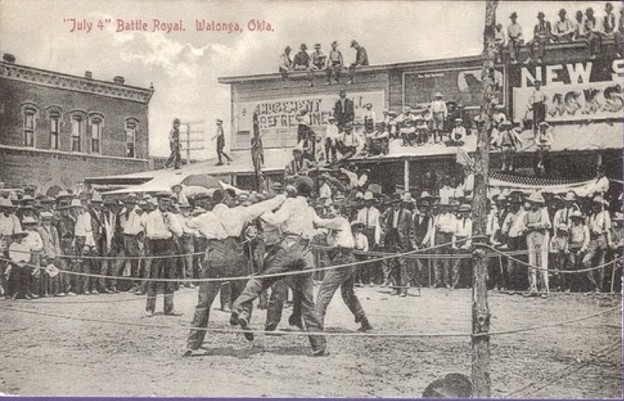Spectacle and ethnicity

Harmony Holiday, The Negro Baseball League (Fence, 2011), 86 pp.—In some of her novels (e.g., Song of Solomon or Paradise), Toni Morrison reconstructs the infra- and super-structures of urban Negro culture after Reconstruction and during Civil Rights legislated integration. The failures of voluntary separatism-cum-Jim Crow segregation which, for Morrison, trump their successes (social and cultural, if not economic or political, independence), are largely, if not exclusively, gender-inflected. Specifically, one can read Morrison’s entire corpus, up to and including A Mercy and Home, as responding to the revamping of masculine, proto-patriarchal tendencies during the dream of black cultural nationalism. So what to make of Harmony Holiday’s dream encapsulated in The Negro Baseball League, a collection of free form (as in free jazz) poems that paint a somber vision of cultural separatism? Not so much an “answer” (as in “answer” song) as another variation on the theme, the accompanying cd, titled deconstruction via duplication, refers not only to the “problem” of cultural imitation-cum-originality per the poems in the book but also alludes, however distantly, to E. Franklin Frazier’s excoriating analysis of ‘white’ blacks, The Black Bourgeoisie. A collage of music, conversations, recitations and speeches, the cd evokes an almost romantic nostalgia for lost possibilities during and after the dream of cultural nationalism. Holiday is a daughter of rhythm & blues songwriter Jimmy Holiday and so it’s hardly surprising that both the book and cd draw extensively on the totality of African American music (from Sun Ra and Pharaoh Sanders to Minnie Riperton and Al Green). The charcoal-esque shading (think Glenn Ligon) over the small font of the middle pages (middle passages?) of the “lyric” booklet that accompanies the cd dovetails with the whispery snatches of words and sampled music into a shrinking, albeit persistent, singularity: the dream as half-remembered dispersals, scattered bits and pieces of what once might have been, replicating in microcosm the scatter effects of the African Diaspora. It’s hardly surprising that the last piece on the cd is titled “I’m Confused Now/ I Love You All” since the cd tracks feature not only a Who’s Who of Negro, black and African American cultural giants but also, sprinkled here and there, white cultural figures (Charles Bernstein, William Burroughs and John Cage). Reversed mirrors in miniature, The Negro Baseball League and deconstruction via duplication imagine a world, or nation, in which the black of black culture is rendered superfluous. That is, like some of the most urgent voices of the Black Arts Movement, Holiday imagines a black culture no longer “watched” (in every sense) by white spectators. More important, she imagines the uprooting of the so-called last plantation, the one black people carry around as crutch and trauma in their collective memories and imaginations. Hence, Holiday’s “Negro” Baseball League which, like Harold Cruse’s “Negro Intellectual,“ refers backs to a moment before the black insurgency of the Sixties and Seventies, a moment now passed, vanquished in large part by the “successes” of the Civil Rights Movement and black militancy ( this motif and value is carried forward by Fred Moten’s The Feel Trio, reviewed here in a couple of weeks). The title of the first poem, “A Rumor About More Earth,” recalls Rob Halpern’s first book, Rumored Place, with a different inflection. Unlike the Marxist- and sexual politics-based stakes in Halpern’s work, Holiday’s invocations are both ethnocentric and anti-ethno-centric. But like Halpern, her work is also unapologetically “personal.” Thus, the “Dumbed fire of a carved pumpkin” cross-stitches the substitute for an absent father, the South as chosen place for a “new” Republic of Africa (as she writes in the eponymous “Negro League,” “…places to be/We need places to be”) and the formation of a grounded, but unbounded, identity (“…searching for girlhood and world and wood…”). This search for “more” and the “same” becomes, as in so many first books by African Americans born after the Black Arts Movement, a matter of cutting ties, crossing borders, though, for Holiday, given her ambivalences, it’s also about crisscrossing, about shuttling back and forth. Thus a poem like “Home Negations” “explains” the narrator’s restlessness as a trait inherited from, or attitude modeled by, the father: “When you walk, sad road across your own movement, what doesn’t diminish is the distance between states of belonging…” For Holiday, the father’s ambivalences become her own, uncertainties unresolved by other roles models, be they those offered by the remnants of black militancy (“…we imagine a man saying get over there be a community…”) or her mother (“my mother would enter laughing in the hind tone a meanness so used to itself it keeps itself company…”). Like so many before her (e.g., young Stephen Daedalus in Joyce’s Portrait of the Artist as a Young Man), she can only turn elsewhere: “He drowns in a mountain lake I am on the brink of crossing.” Of course, nothing is promised in this world. As she puts it at the end of part one of this magnificent, troubling and awkwardly moving book, “Ideas are the saddest thing Ideals are the next saddest.”
Hunches, hedges, etc.